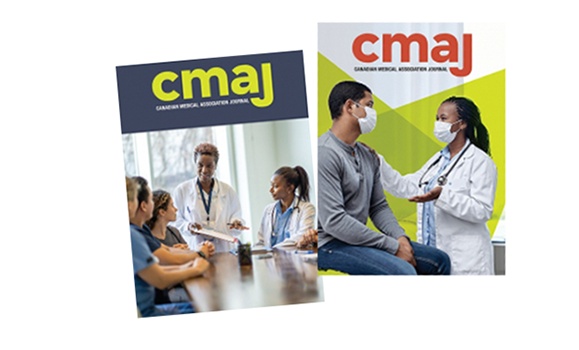Until very recently, the pages of Canada’s top scholarly medical journal were decidedly white — and not just the paper and screens they appear on.
 When Dr. OmiSoore Dryden of Dal and Dr. Onye Nnorom, a colleague at the University of Toronto, first approached the in 2020 seeking figures on how many Black authors they’d published, the response was even more bleak than they’d feared: "I think we’ve published one," Dr. Dryden, the James R. Johnson Chair in Black Canadian Studies, recalls them saying.
When Dr. OmiSoore Dryden of Dal and Dr. Onye Nnorom, a colleague at the University of Toronto, first approached the in 2020 seeking figures on how many Black authors they’d published, the response was even more bleak than they’d feared: "I think we’ve published one," Dr. Dryden, the James R. Johnson Chair in Black Canadian Studies, recalls them saying.
The interaction sparked a bigger conversation about anti-Black racism with the journal, one that culminated this fall in the publication of two special issues centred exclusively around anti-Black racism and Black health in Canada.��
Shown right: Dr. OmiSoore Dryden.
More than just two issues, the publishing initiative — initiated and spurred on by the national Black Health Education Collaborative, of which Drs. Dryden and Nnorom are co-founders and co-leads, and supported by Dr. Mark Hanson — has created an editorial shift at the journal designed to create a more equitable and welcoming publishing environment for Black researchers and scholars moving forward.��
“The special issues are a start, yet more work needs to be done by the CMAJ Group and academic journals to address racism in systems and processes,” wrote Kirsten Patrick, the journal’s editor, in to one of the issues.��
Such openness to change didn’t arrive easily, though, as Dr. Patrick openly admits in her piece. The journal initially declined the idea of even publishing a special issue.
For Dr. Dryden, the whole experience echoed her past experiences and those of other Black scholars working in medical and health research in Canada.
“It is not uncommon to receive biased and even racist peer reviews in response to articles or funding applications. And, as a result, our work is refused and our funding denied,” she says. “These are documented experiences for Black researchers and scholars in Canada.”
Find the two full issues here: I
Disrupting anti-Black racism
At the core of the two special issues lies a key theme about how anti-Black racism — in both the delivery of care and in the training of Black practitioners — directly impacts the health outcomes for Black people across the country.��
Topics tackled in the issues range from the experiences of Black medical students and how anti-Black racism manifests in academic medical circles to efforts for addressing historical anti-Black racism in health care professions and models of embedding Afrocentric principles in health care delivery.
Dr. Dryden was joined by several other Dal scholars in submitting articles as part of the editorial package. She hopes the issues send a powerful message about anti-Black racism in health care and produces anti-racist change in healthcare systems.��
“This is not about proving anti-Black racism exists — we know it exists. It is about providing tools for practitioners so they are able to accept their role in change and recognize, acknowledge and disrupt anti-Black racism,” she says.
Recommended reading:��Dal’s James R. Johnston Chair in Black Canadian Studies celebrates 25 years of scholarly impact
The next generation
Several of the pieces published also convey an important point about a shift needed in prepping the next generation of medical professionals so that they, too, are able to recognize, acknowledge, and disrupt anti-Black racism and ultimately work to decrease health disparities and increase positive health outcomes for Black people.
“Medical education and training need to do a better job of educating people in addressing anti-Black racism and understanding anti-Black racism as a ‘co-morbidity’ with the health concerns raised by Black patients,” she says. “There needs to be greater accountability with respect to anti-Black racism and Black health in all areas of healthcare with measurable objectives.”
“Understanding how racism works is a specialty,” she says. “It's not just a reliance on personal experiences. It requires training in the discourse, scholarship, research, and practices. It is a specialty, an expertise. And I think there’s not enough of an acknowledgement of that.”
The labour invested by Dr. Dryden and others to get the special issues published was considerable — and yet another indicator of the systemic barriers in operation.��
“It took us almost two years to get here. It should not have taken that long.”
A snapshot of Dal scholarly contributions
Article title:
�� (Vol. 194, Issue 41, 24 October 2022)
Authors: Delia Douglas, Sume Ndumbe-Eyoh, Kannin Osei-Tutu, Barbara-Ann Hamilton-Hinch, Gaynor Watson-Creed, Onye Nnorom and OmiSoore H. Dryden; on behalf of the Black Health Education Collaborative
Summary:��
It is precisely because Critical Race Theory offers health care practitioners critical interrogation and pedagogy that would not otherwise be available to practitioners, that it creates new and impactful understanding of the root causes of health inequities for Black people. This serves the profession well, particularly at a time when the world is demanding attention to longstanding false beliefs about racism and “race” that must now be corrected.
Article title:
(Vol. 194, Issue 42, 31 Oct, 2022)
Author:��Gaynor Watson-Creed, Associate Dean, Serving and Engaging Society in �鶹��ý's Faculty of Medicine.
Summary:
Institutional betrayal behaviours, such as gaslighting of victims of anti-Black racism, have devastating consequences, yet are seldom acknowledged. They play critical roles in extending the harms from racism and undermine institutions’ integrity and reputations even as the institutions attempt to make meaningful gains in equity, diversity and inclusion. Groups that hold unearned privilege may be at risk of perpetrating gaslighting. Groups at high risk of racism, including faculty members who are Black, but also those experiencing other or intersecting forms of oppression, may be at high risk of institutional betrayal. Faculties of medicine should be aware of these behaviours within their own organizations and make every effort to identify, expose and eliminate them.
Article title:
(Vol. 194, Issue 42, 31 Oct, 2022)
Authors:��Nathalee P. Ewers, Rafeeda Khashmelmous and Barbara-Ann Hamilton-Hinch
Summary:
We present an enhanced understanding of the early experiences of anti-Black racism among aspiring and practising health professionals, and their experiences navigating a system that was not designed for them to succeed. The knowledge developed through this research may help to improve health programs for racialized and other vulnerable populations and bring attention to the race-based educational opportunity gap that has been posited in Nova Scotia. Recommendations include increased representation, support programs and updated curricula. Students of African descent have proven their ability, resilience, compassion and willingness to pursue a health profession; it is now up to education and health care institutions to create and maintain a space of belonging and welcoming at all levels so that Black students can continue to excel.
Article title:
����(Vol. 194, Issue 41, 24 October 2022)
Authors: Keisha Jefferies, Ruth Martin-Misener, Gail Tomblin Murphy, Jacqueline Gahagan and Wanda Thomas Bernard
Summary:��
This qualitative study clarifies how ANS ancestry is implicated in the perception and practice of leadership for ANS nurses. Nurses of ANS ancestry determined leadership to be a fundamental, integral component to nursing practice, grounded in community-oriented care. This study provides new insights that could inform existing strategies related to the recruitment, retention and representation of people of ANS ancestry in nursing and other health professions, including medicine.

